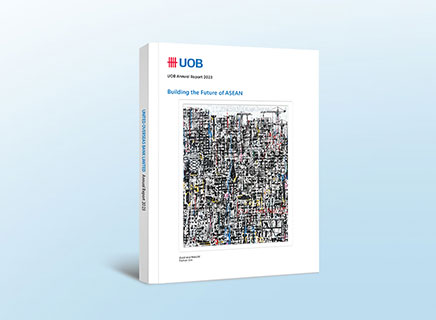IBOR Transition
The London Interbank Offer Rate (LIBOR), one of the global benchmark rates for financial products ranging from loans and bonds to derivatives, will cease by the end of 2021. LIBOR is one of the Interbank Offer Rates (IBOR) used globally to set the benchmark rate for a wide range of financial products.
As a bank with a global network across Asia Pacific, Europe and North America, UOB has been engaging regulators across various jurisdictions on the transition from IBOR-based interest rate benchmarks to appropriate alternatives in the banking products we offer to our customers.
We are committed to providing our customers advance notice before these changes take place to keep you updated on the changes that will impact you. We also encourage you to stay up to date on industry developments, including referring to UOB’s Rates Strategy reports on developments of the IBOR transition.
Background
In 2014, the Financial Stability Board released a report recommending the replacement of the LIBOR. Regulators around the world are now working through an IBOR transition process to identify and to develop risk-free reference rates (RFRs). RFRs are overnight interest rate benchmarks based on actual transactions and are hence more transparent and more reflective of market conditions.
The transition from IBOR to RFRs is expected to occur by end-2021. Regulators and market participants, including UOB, are working toward effecting a smooth transition.
Several major economies are transitioning to alternative benchmark rates. Click the links in the table below for more information and the latest developments.
-
IBOR Currency
-
IBOR Administrator
-
Alternative RFR
-
Alternative RFR Administrator
-
Public/Private Sector Working Group
| Australia |
| Canada |
| European Union |
| Hong Kong |
| Japan |
| Singapore |
| Switzerland |
| Thailand |
| UK |
| US |
Source: "Benchmark Reform and Transition from LIBOR", The International Swaps and Derivatives Association (ISDA).
Singapore's transition to SORA
In Singapore, there are two key Singapore Dollar (SGD) interest rate benchmarks, namely the Swap Offer Rate (SOR) and the Singapore Interbank Offered Rate (SIBOR), that are widely referenced in financial contracts for products such as bonds, derivatives, loans, mortgages and structured notes.
In line with global interest rate benchmark reforms, the Singapore banking industry will move towards the Singapore Overnight Rate Average (SORA), as SOR and SIBOR are phased out.
Transitioning to SORA
The use of SOR as a benchmark rate will be affected by the discontinuation of LIBOR after 2021. This is because the SOR methodology relies on US Dollar (USD) LIBOR in its computation. SOR will be discontinued after 30 June 2023 together with USD LIBOR.
In August 2019, ABS and the Singapore Foreign Exchange Market Committee (SFEMC) announced that they had identified SORA as the most suitable and robust interest rate benchmark to replace SOR.
SORA has been published by the Monetary Authority of Singapore (MAS) since 2005 and is a robust benchmark that is underpinned by a deep and liquid overnight interbank funding market. SORA is derived from taking the volume-weighted average of all the SGD rates of overnight cash transactions done in Singapore in the interbank market from 8.00 am to 6.15 pm for a given business day. It is then published by 9.00am the next business day on the MAS website. You may wish to visit the The Association of Banks in Singapore's (ABS) website and the MAS website for more details on SORA.
To ensure a smooth transition to SORA, the MAS has set up an industry-led Steering Committee for SOR Transition to SORA (SC-STS). The SC-STS, comprising senior representatives from key banks, relevant industry associations and MAS, provides strategic direction on industry proposals to develop new products and markets based on SORA while supporting this transition process. In March 2020, the SC-STS released the transition roadmap and their key priorities to achieve a smooth transition to SORA. Read the report here.
On 27 October 2020, the SC-STS announced industry timelines to support a coordinated shift away from the use of the SOR in financial products and concurrently, to accelerate usage of SORA. The timelines seek to reduce exposures to SOR steadily well before end-2021, in preparation for USD LIBOR and SOR discontinuation, while ensuring that SORA-based products are available to meet the financing needs of customers. After end-April 2021, SORA is expected to be the de facto floating rate benchmark for all institutional SGD financing activity. By end-2022, all corporate and retail SOR contracts will have to be switched to SORA-based contracts.
Discontinuation of SIBOR
The ABS announced in June 2020 that the 12-month SIBOR will be discontinued in end-2020, with the last publication to be on 31 December 2020. The discontinuation of the 12-month SIBOR is due to low market usage as well as a lack of underlying transactions underpinning this tenor.
The 6-month SIBOR will be discontinued from 1 April 2022. The discontinuation of 6-month and 12-month SIBOR is not expected to impact many customers given the low market usage of these rates.
The transition of financial contracts referencing the more widely used 1-month and 3-month SIBOR will take place after the industry has substantially completed the transition from SOR to SORA. As such, 1-month and 3-month SIBOR will only be discontinued by end-2024, to provide sufficient time for the transition of existing SIBOR contracts.
Next steps
If you wish to find more about Singapore’s transition to SORA, you can visit the ABS website. The SC-STS has also published a set of market guides to help users prepare for the shift to SORA across a range of financial products, including derivatives, floating rate notes, business and retail loans.<
- Overview on the Usage of SORA in Loans: Customer Segments and Preferences. This sets out how SORA can be used in loans to meet the various needs of financial firms, large corporates, small- and medium-sized enterprises and retail customers.
- SC-STS End-User Checklist on Benchmark Transition. This provides non-financial corporates, investment firms, insurers and other buy-side participants with a list of key steps needed to implement effectively the transition from SOR to SORA, as well as from LIBOR to alternative reference rates.
- SORA Market Compendium on the Transition from SOR to SORA. This provides market participants with a comprehensive overview of SORA market conventions across derivatives, floating rate notes, business and retail loans, and outlines considerations for contractual and technical specifications of SORA products and contractual fallbacks for relevant SOR contracts.
If you have outstanding contract(s), for example loan(s) or derivative(s) that reference(s) SOR or SIBOR, we will be contacting you with details of how you may be impacted. We will provide you with ample notice to consider your options before the transition takes place.
You can also contact us through our Customer Service hotline at 1800 222 2121 or speak with your relationship manager or client adviser for further assistance.





